A new report from Deloitte Insights predicts that the tokenized real estate market will experience dramatic global expansion by 2035, signaling a transformative shift in how property is owned, traded, and accessed. As blockchain infrastructure matures and regulation evolves, tokenization is positioned to revolutionize the $300+ trillion real estate sector, turning once illiquid assets into dynamic, tradeable instruments.
What Is Tokenized Real Estate?
Tokenized real estate involves representing ownership of property (or fractional interests) on a blockchain via digital tokens. Each token corresponds to a real share in a physical property—residential, commercial, or industrial.
Key benefits of this model include:
-
Fractional ownership, lowering barriers to entry
-
24/7 trading, unlike traditional real estate markets
-
Programmable smart contracts to automate compliance and revenue distribution
-
Global access to previously regional or exclusive assets
This evolution allows retail and institutional investors alike to participate in real estate markets more efficiently, securely, and with unprecedented transparency.
The Growth Drivers: Why 2035?
Deloitte’s forecast is rooted in several macro and technological trends expected to converge over the next decade:
-
Wider regulatory acceptance of blockchain-based asset management
-
Advances in property digitization, title tokenization, and KYC/AML protocols
-
Growing demand for accessible, liquid real estate products
-
Demographic shifts, with younger generations preferring digital-first investment options
By 2035, tokenized real estate may move from a niche innovation to a mainstream investment category, woven into pension funds, ETFs, and everyday wealth management strategies.
Accessibility and Liquidity at the Core
One of the most cited challenges in real estate investment has been liquidity—selling a property or stake typically takes weeks or months. With tokenization:
-
Assets can be traded near-instantly on regulated secondary markets
-
Property shares can be used as DeFi collateral
-
Smaller investors can buy in, driving capital democratization
This could unlock trillions of dollars in dormant global real estate value.
A Catalyst for Financial Inclusion
As digital wallets and mobile finance platforms expand globally, tokenized real estate offers a gateway to wealth-building for populations historically excluded from property ownership. From Africa to Southeast Asia, this technology has the potential to reshape financial inclusion.
Deloitte also points out that institutional adoption will act as a multiplier. As major banks and investment firms tokenize real estate portfolios, confidence and adoption will accelerate.
Challenges Still Remain
Despite the optimism, the report acknowledges obstacles:
-
Legal frameworks for tokenized titles are still fragmented
-
Property valuation and on-chain governance need global standards
-
Tech literacy and infrastructure gaps may delay adoption in some regions
However, these are viewed as solvable issues on a clear path toward mass adoption.
By 2035, tokenized real estate could stand as a cornerstone of the digital financial ecosystem, according to Deloitte. What began as a blockchain experiment may soon reshape how we buy, sell, and hold the most valuable asset class in the world. The era of programmable property is fast approaching—and investors who move early may benefit most.




